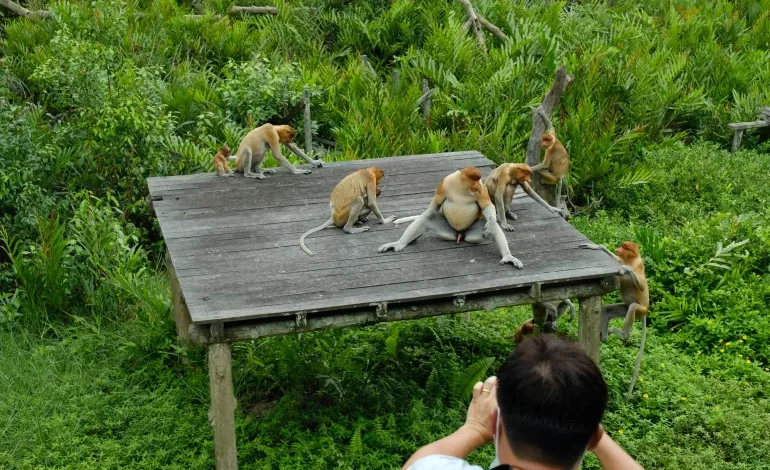Can plantations value more than profit? Some in Malaysia think so

At the Labuk Bay Proboscis Monkey Sanctuary on the eastern coast of Sabah in Malaysian Borneo, you have to drive along kilometres of bumpy dirt roads flanked by columns of palm oil trees before arriving at a spot where you can watch the endangered monkeys feeding up close.
The sanctuary, which has grown to some 202 hectares (500 acres) of mangroves and is home to about 200 proboscis monkeys, is owned by a palm oil company and located on about 283 hectares (700 acres) of plantation.Since 2000, the Yet Hing Plantation has been feeding the monkeys – endemic to Borneo and famous for their tawny-coloured fur and the males’ bulbous noses – and charging tourists to see them.
But it is now taking the endeavour more seriously.
In 2021, it acquired some 18 hectares (43 acres) – roughly the size of 33 football fields – of a neighbouring palm oil plantation that was unproductive and sought the expertise of the Sabah Forestry Department to plant 35,000 saplings of more than 20 mangrove species to extend the monkeys’ habitat.
The idea is to create a wildlife corridor – tracts of forest to connect natural landscapes split apart by agriculture and other human activity – for the animals and keep them away from the crops, while also protecting the plantation by providing a buffer against the risk of floods.“We try to maintain the balance between economic activity and conserving the ecosystem of the mangroves along our plantation. The private sector can do it if they plan it properly,” said 69-year-old Michael Lee Hing Huat, who co-founded Yet Hing Plantation with his brother. “It’s not idealism or whatever. These two activities can come together.”
Such statements sit uneasily for some, especially when palm oil is seen as a key driver of deforestation. Indonesia and Malaysia together account for 85 percent of the world’s palm oil exports and both countries have been threatened with a boycott by other governments as well as consumers for unsustainable practices. Whether palm oil can be produced sustainably is a deeply divisive issue.
Animals in estates
In Malaysian Borneo, industrial palm oil development accounted for between 57 and 60 percent of all deforestation from 1973 to 2015, according to a 2018 report by the International Union for Conservation of Nature (IUCN).
The resulting habitat loss and fragmentation is a significant threat to the proboscis monkey as well as other iconic endangered species such as the pygmy elephant and orangutan. A 2019 study found that the proboscis monkey population along the Kinabatangan River, an important habitat for wildlife fragmented by plantations, was declining by 10 percent a year as a result of deforestation.“There are quite a number of locals who do believe that the foreign anti-palm oil campaigns are really just a ploy by those who produce their own vegetable oil, such as from corn or sunflower – an anti-global south thing,” she added.
Because of the socioeconomic benefits palm oil cultivation offers – as well as the fact that more and more wildlife is roaming in plantations – it is increasingly seen as necessary that palm oil be produced more sustainably and that agribusinesses take a more active role in conservation.
“When I first started, I always promised myself not to work with the palm oil industry. But now we cannot avoid working with them – at least for the elephants,” said Nurzhafarina Othman, the founder of the nonprofit Seratu Atai, which works with smallholders to minimise human-elephant conflict.
These animals need large areas to roam and in the last 40 years, 60 percent of natural elephant habitat in Sabah has been lost, mostly as forest is converted for agriculture.
Between 2010 and 2021, at least 200 elephants died – some of which were found to have been poisoned on or near palm oil plantations. The state authorities estimate there are fewer than 1,500 pygmy elephants left in Sabah.“There are quite a number of locals who do believe that the foreign anti-palm oil campaigns are really just a ploy by those who produce their own vegetable oil, such as from corn or sunflower – an anti-global south thing,” she added.
Because of the socioeconomic benefits palm oil cultivation offers – as well as the fact that more and more wildlife is roaming in plantations – it is increasingly seen as necessary that palm oil be produced more sustainably and that agribusinesses take a more active role in conservation.
“When I first started, I always promised myself not to work with the palm oil industry. But now we cannot avoid working with them – at least for the elephants,” said Nurzhafarina Othman, the founder of the nonprofit Seratu Atai, which works with smallholders to minimise human-elephant conflict.
These animals need large areas to roam and in the last 40 years, 60 percent of natural elephant habitat in Sabah has been lost, mostly as forest is converted for agriculture.
Between 2010 and 2021, at least 200 elephants died – some of which were found to have been poisoned on or near palm oil plantations. The state authorities estimate there are fewer than 1,500 pygmy elephants left in Sabah.










